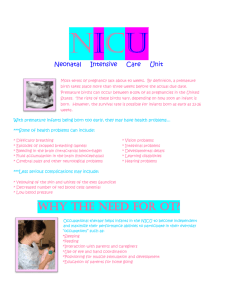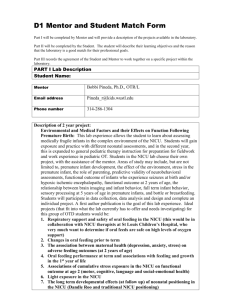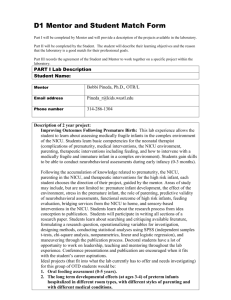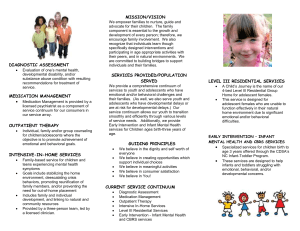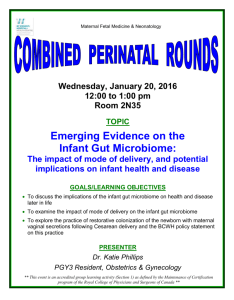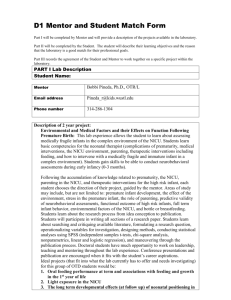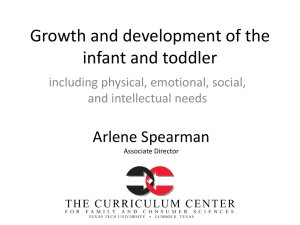what is neuro-developmental supportive care (ndsc)?
advertisement
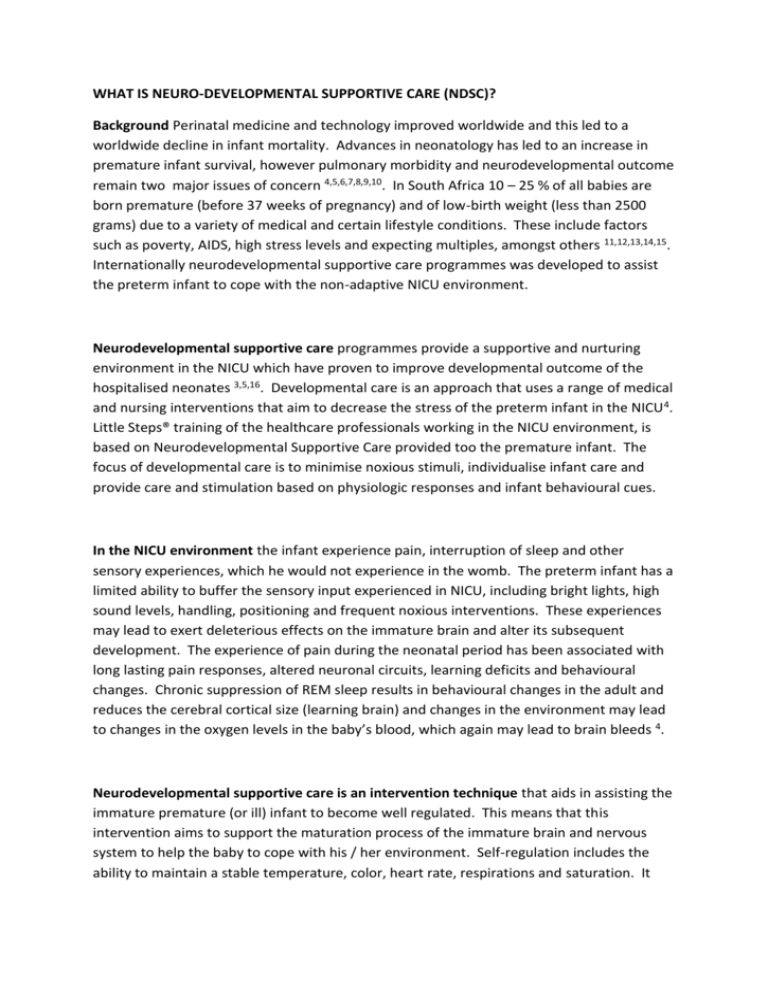
WHAT IS NEURO-DEVELOPMENTAL SUPPORTIVE CARE (NDSC)? Background Perinatal medicine and technology improved worldwide and this led to a worldwide decline in infant mortality. Advances in neonatology has led to an increase in premature infant survival, however pulmonary morbidity and neurodevelopmental outcome remain two major issues of concern 4,5,6,7,8,9,10. In South Africa 10 – 25 % of all babies are born premature (before 37 weeks of pregnancy) and of low-birth weight (less than 2500 grams) due to a variety of medical and certain lifestyle conditions. These include factors such as poverty, AIDS, high stress levels and expecting multiples, amongst others 11,12,13,14,15. Internationally neurodevelopmental supportive care programmes was developed to assist the preterm infant to cope with the non-adaptive NICU environment. Neurodevelopmental supportive care programmes provide a supportive and nurturing environment in the NICU which have proven to improve developmental outcome of the hospitalised neonates 3,5,16. Developmental care is an approach that uses a range of medical and nursing interventions that aim to decrease the stress of the preterm infant in the NICU 4. Little Steps® training of the healthcare professionals working in the NICU environment, is based on Neurodevelopmental Supportive Care provided too the premature infant. The focus of developmental care is to minimise noxious stimuli, individualise infant care and provide care and stimulation based on physiologic responses and infant behavioural cues. In the NICU environment the infant experience pain, interruption of sleep and other sensory experiences, which he would not experience in the womb. The preterm infant has a limited ability to buffer the sensory input experienced in NICU, including bright lights, high sound levels, handling, positioning and frequent noxious interventions. These experiences may lead to exert deleterious effects on the immature brain and alter its subsequent development. The experience of pain during the neonatal period has been associated with long lasting pain responses, altered neuronal circuits, learning deficits and behavioural changes. Chronic suppression of REM sleep results in behavioural changes in the adult and reduces the cerebral cortical size (learning brain) and changes in the environment may lead to changes in the oxygen levels in the baby’s blood, which again may lead to brain bleeds 4. Neurodevelopmental supportive care is an intervention technique that aids in assisting the immature premature (or ill) infant to become well regulated. This means that this intervention aims to support the maturation process of the immature brain and nervous system to help the baby to cope with his / her environment. Self-regulation includes the ability to maintain a stable temperature, color, heart rate, respirations and saturation. It further includes good muscle tone, maintaining flexion at rest and during handling, with smooth well modulated movements 4. Neurodevelopmental supportive care interventions that form part of developmental supportive care (and Little Steps® training) involve: The structuring of the physical and social environment, through controlling external stimuli, such as noise, light, movement and touch in the NICU 5. Appropriate positioning to support the development of physiological flexion 17. Clustering of care activities to minimise handling of the infant and giving the infant longer periods of rest 5. Furthermore, it includes involving parents in the care taking process as soon as possible with interventions such as Kangaroo Mother Care and feeding. Kangaroo Mother (and Father) Care contributes, amongst others, to thermoregulation, identified by the WHO as “essential newborn care” 8. The benefits of Neurodevelopmental Supportive Care include 4. Better neurobehavior at two weeks and nine months corrected age 4 Fewer days on ventilation. Seghal and Stack 4 reports on three trials that showed a mean difference in length of ventilation of 27.7 days Reduces oxygen requirements by up to 41 days Improved growth and development outcomes Sooner transition from tube to oral feeding, due to improvements in sleep states and decreased stress behaviour during tube feeding A self-regulated infant also demonstrates improved sleep and awake states, which saves energy expenditure and decrease stress behaviour during tube feeding Shorter hospital stay when using non-nutritive sucking The mental developmental index at 9-12 months of age showed an improvement with the implementation of developmental care 5 Kangaroo Mother Care contributes to exclusive breastfeeding for a longer period of time, better immunity, neurological development and much more 18 Developmental assessment and care is often relegated as a follow-up issue 4, but with early intervention (from birth), the short and long term outcome of these preterm babies are much better. These early interventions are a compilation of different novel and lowtechnology interventions. These interventions include training on and implementation of low-technology care techniques, such as KMC, breastfeeding (and breastmilk banking to provide in the need), optimising the NICU environment to support development, neurodevelopmental supportive, individualised and family-centred care. The effect of these interventions will in turn reduce the pressure on human and financial resources to provide medical care for the preterm infant and his/her family for an extended period of time; contributing to a healthier and wealthier society. REFERENCES 1. Lubbe, W. 2003. Early Intervention Care Programme for Parents of Neonates. Dissertation. M Tech. Tshwane University of Technology (Former Technikon of Pretoria. Unpublished. 2. Lubbe. W & Bornman J. 2005. Early Intervention Care Programme for Parents of Neonates. Curationis, 28(5): 73-82. December. 3. Als, H. 2001. Program Guide. Newborn Individualised Developmental Care and Assessment Program (NIDCAP) – An Education and Training Program for Health Care Professionals. June. NIDCAP Federation International. Internet. 4. Sehgal, A & Stack, J. 2006. Developmentally Supportive Care and NICDAP. Indian Journal of Pediatrics, 73 (11) 1007-1010 5. Symington, A and Pinelli, J. 2006 (date edited). Developmental care for promoting development and preventing morbidity in preterm infants. The Cochrane Library, 4. Available online http://www.nichd.nih.gov/cochrane/symington/symington.htm#Background 6. NANN. 2000. Infant Family-Centered Developmental Care: Guideline for Practice. Illinois: NANN. 7. EUROPEAN SCIENCE FOUNDATION SCIENTIFIC NETWORK. Research on early developmental care for extrememly premature babies in neonatal intensive care units (EDC). 2002-2004. 8. WHO. 1996. Essential Newborn Care - Care of the preterm and / or low birth weight newborn. http://www.who.int/reproductivehealth/publications/MSM_96_13/MSM_96_13_Chapter1.en.html. Accessed 02 September 2007. 9. UCSF Children’s Hospital. 2004. Very Low and Extremely Low Birthweight Infants. Intensive Care Nursery House Staff Manual. The Regents of the University of California. 10. National Institutes of Health (NIH). 1999. Low Birth Weight in Minority Populations. 22 January. Available on NIH (sien web) 11. UNICEF – Low Birth weight: Country, regional and global estimates. http://www.unicef.org/publications/files/low_birthweight_from_EY.pdf accessed 22 December 2006 12. Statistics South Africa, http://www.statssa.gov.za accessed 22 December 2006. 13. Statistics South Africa http://www.statssa.gov.za/publications/SAStatistics/SAStatistics2001.pdf Accessed 22 December 2006 14. Pattinson, R. C. Saving Babies: A Perinatal Care Survey of South Africa, 2 000 Executive Summary, available from http://www.scienceinafrica.co.za/2001/july/babies.htm#Top. 15. Medical Research Council of South Africa, available on http://www.mrc.ac.za/policybriefs/childmortality.pdf accessed on 20 December 2006. 16. Nair, MNG, Gupta, C and Jatana, SK. 2003. NICU Environment: Can we be Ignorant? MJAFI. 95(2), 93-95. 17. Young 1999 18. BERGMAN, N. 1998. Introducing kangaroo-mother care. PEDMED, September/October: 9-10 19. Paediatric Neonatal Work Group http://www.doh.gov.za/mts/reports/neonatology.html

